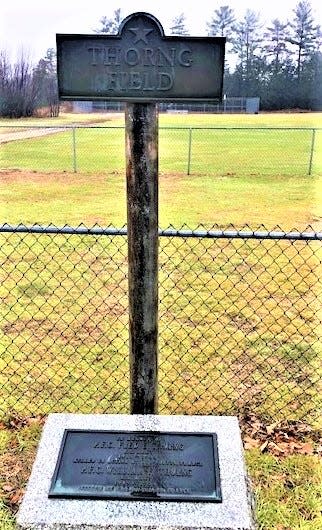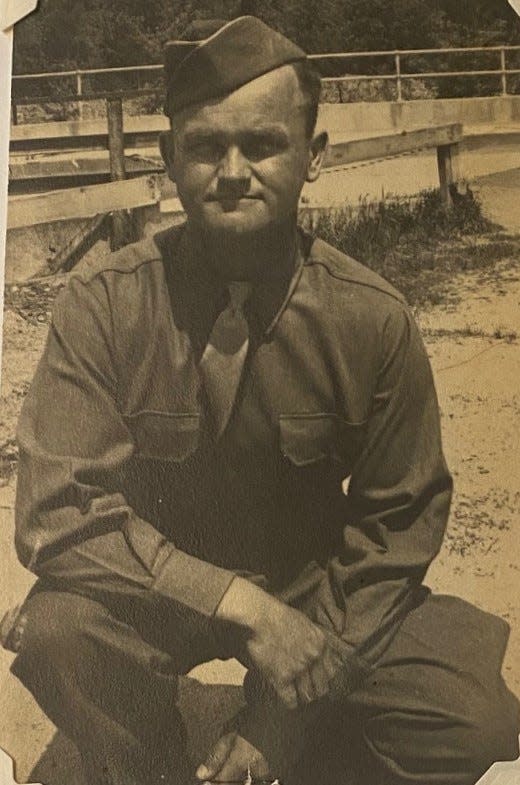Remembering Local World War II Heroes: Frederick and William Thorng of Barre
BARRE – It was four weeks. Exactly 28 days between the death in France of Pfc. Frederick E. Thorng and his younger brother Staff Sgt. William F. Thorng.
“It’s hard to imagine what it could have been like for that family,” said Steven Brewer of Barre, a former longtime state representative and senator of that district. “To get the same knock on the door only four weeks apart. Can you imagine?”
This is the continuation of the series Remembering Local World War II Heroes.
There were four sons and two daughters born to Frederick Hancock and Florence Edna (Wyman) Thorng when they lived in Lawrence. Aside from Frederick and William, there were sons Thelbert (born 1923) and George (born 1927) and daughters Natalie (Thorng) Riendeau (born 1912) and Frieda (Thorng) Ingraham (born 1914).

Their father, Frederick Sr., had been a veteran of World War I and fought with the 26th Division in France, receiving the Purple Heart. He was also a member of the Barre American Legion, Post 2.
Pfc. Frederick E. Thorng (1915-1944)
Frederick Edwin Thorng was born Nov. 18, 1915 in Lawrence. His father took a job in Barre and the family moved to the Central Massachusetts community in the late 1920s. Young Frederick was an active member of the South Barre Sea Scouts for over 10 years.
He attended grammar school in Lawrence and the High Plains School in Barre. He later graduated from Barre High School with the Class of 1934. Before entering the service, he was employed by the Barre Wool and Combing Co. in the dye house and the shipping department.

Thorng entered the Army on Dec. 28, 1943 at Fort Devens. He was later sent to England and then over to France, serving with the Army ground forces. It was as a member of the U.S. Army, 112th Infantry that he met his death, after being overseas for about six weeks. He was married and had a son, Thomas.
Pfc. Thorng was killed in action on Aug. 8, 1944 at Les Montis, France at the age of 28, according to a telegram received from the War Department by his wife. He was in an infantry regiment.
He was buried in Glen Valley Cemetery, Barre.
Pvt. William F. Thorng (1919-1944)
William Frederick “Chuck” Thorng was born on Oct. 1, 1919 in Lawrence.
He also attended grammar school in Lawrence and High Plains School before his 1938 graduation from Barre High School.
According to the Barre High yearbook “The Barretone,” a quote attributed to him was “Wise man say nothing in dangerous times.” He was described as one of the quieter members of the senior class who was “well informed on the United States Navy and can answer any question asked of him on this subject, for he plans to be on the high seas after he graduates.”

His nephew and namesake Chuck Thorng recalled stories spun about his uncle’s hunting abilities which earned him his nickname.
“He was the best woodchuck hunter in Barre, that’s why they called him Chuck,” his nephew said, noting that some farmers in town would pay him 25-cents for each woodchuck he’d shoot.
“He’d go out there with his .22 rifle and bring home money to help feed the family with the woodchucks he’d shoot,” Thorng added.
William enlisted in the Army on Aug. 14, 1939, reporting to Fort Devens. He was then sent to Panama, where he remained for four years and one month without a furlough. He was a member of the Airborne Division in Panama, but after graduating from Fort Benning, Georgia, on Jan. 1, 1944, he received his silver wings as a paratrooper.
His only furlough in approximately four years of service in the Army was in September of 1943, when he was home for 28 days. In this long period of service to his country, his parents saw him only 44 days in all.
Thorng’s brother Thelbert had been a gunner’s mate, second-class on a mine sweeper in the vicinity of Italy. He had been away from the States for over two years when the two brothers had a happenstance meeting for about 10 minutes. It was their first meeting after about five years and occurred a few short months before William’s death.
Pvt. William Thorng was reportedly killed in action near Col de Braus, France on Sept. 7, 1944 only 28 days after his older brother Pfc. Fred Thorng was also killed in action in France.
A member of the U.S. Army 517 Parachute Infantry Battalion, Pvt. William Thorng was among the first paratroopers to land in Southern France. That was all that was known of his activities prior to the telegram received by his parents from the War Department on Oct. 10, telling them of his death.
Later, a citation was awarded posthumously and presented to his family which read:
“For gallantry in action, near Col de Braus, France, Sept. 6, 1944. While reconnoitering defensive positions, Pvt. Thorng, lead scout for his company, was first to discover an impending enemy counterattack. At that time being in the process of deployment, the company was unprepared to cope with an assault by a numerically superior force. Pvt. Thorng with cool daring, left his sheltered position and dashed through a hail of mortar and artillery fire toward the enemy, firing his machine gun.
His prompt aggressive action alerted the company, and allowed his officers to establish a defense. During a subsequent operation, Pvt. Thorng, again bravely exposing himself to furious enemy fire, advanced on a machine gun nest. Seizing the rifle of a fallen comrade, after shrapnel had damaged his own, he pressed forward amid the falling shells. After inflicting severe casualties on the enemy and causing them to withdraw, Pvt. Thorng was fatally wounded. The gallantry of Pvt. Thorng’s action exemplifies the traditional valor of the American soldier under fire.”
Pvt. William Thorng, posthumously awarded the Silver Star and Purple Heart, was buried in Glen Valley Cemetery, Barre.
A story in the Oct. 12, 1944 edition of Barre Gazette refers to William Thorng as a staff sergeant rather than a private, but the government's citation and his gravestone both refer to him as a private. We could not find a reason for the discrepancy.
On May 22, 1949, as part of a dedication of many of the World War II monuments in Barre, the baseball field at High Plains was dedicated Thorng Field in honor of the two brothers from Barre who lost their lives within a month of one another.
Comments and suggestions for Remembering Local World War 2 Heroes can be sent to Mike Richard at mikerichard0725@gmail.com or in writing Mike Richard, 92 Boardley Rd. Sandwich, MA 02563.
This article originally appeared on Gardner News: Frederick and William Thorng of Barre MA were killed in action in WWII

